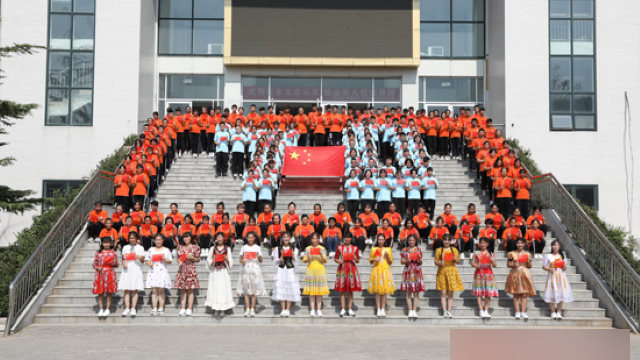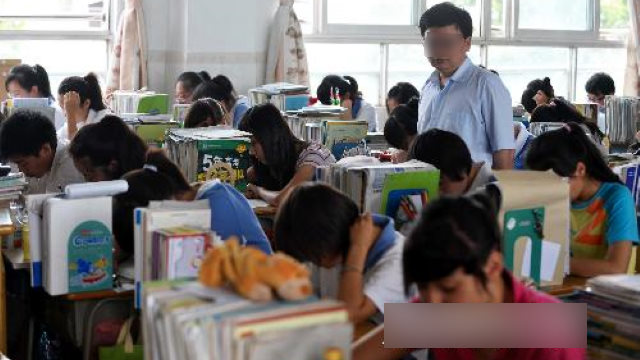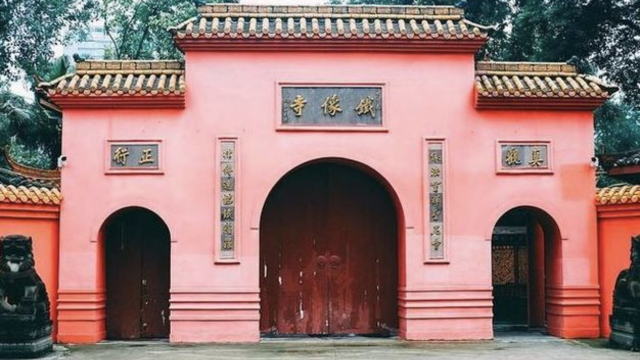Enrolled to study outside Xinjiang, Uyghur students are subjected to intense indoctrination and “hanification,” intended to veer them from their religion and culture.
by Wang Yichi
To accelerate the “hanification” of ethnic Muslims, the Chinese government recruits students from the Xinjiang Uyghur Autonomous Region to study in other parts of China. The state covers their tuition and all expenses, and specially-assigned staff accompany them on trips from and to Xinjiang, otherwise assist and supervise them.
In 2010, the Ministry of Education issued a document, entitled Administrative Measures for Inland Senior High School Classes Consisting of Students from Xinjiang, which directs to “strengthen the education of students’ identification with the great motherland, the Chinese nation and culture, and the path of socialism with Chinese characteristics; strengthen the education promoting the Marxist views of the motherland, nation, religion, materialism, and atheism.”
A middle school in central China hosts hundreds of students from Xinjiang. While they are enjoying what can be seen as “favorable treatment,” in reality, they have lost their freedom and are in danger of losing their ethnic identity. Bitter Winter talked to some of them as well as a few of their teachers.
Afraid to discuss religion
The start of the talk with the students was not easy. They seemed scared and nervous. “We’re not religious, we know nothing about religion,” the students were fast to state that they were not Muslim, waving their hands when asked if they come from religious families.
After some time, the students gradually relaxed, let down their guard, and started opening up. They admitted that they were homesick, missing their families at home, and felt oppressed by the school.

“The school doesn’t allow any form of faith. We’re banned from going to the mosque. We will be expelled if someone discovers that we may be religious,” said a sophomore boy. “We largely preserve our customs by eating our traditional food when we can.”
The school administration asked the boy to join the dragon dance – a traditional Han Chinese dance, usually performed during festive celebrations, like the Chinese New Year. “We prefer our traditional dances. I don’t like the dragon,” the boy explained, adding that for practicing Muslims, adoration of idols is considered blasphemous.
The love for the Party and country comes first
“Students from Xinjiang are subjected to forced indoctrination,” a Han teacher in the school said. “Their primary task is not to study, but to learn how to love the country and the Party.”
According to a freshman girl, on October 1, the Chinese National Day, local Han Chinese students were freed from school for the holiday, while students from Xinjiang were ordered to attend a flag-raising ceremony and swear allegiance to the government. They were told to watch the celebrations dedicated to the 70th anniversary of the founding of Communist China and write down their impressions.
The children were also forced to watch patriotic movies, like “The Founding of a Republic” and “The Beginning of the Great Revival.”
“The government wants children from Xinjiang to study communist ideology from a very young age, preventing them from learning their culture, traditions, and language,” a local Muslim commented. “By not allowing these children to practice their faith, the state attempts to ‘normalize’ them.”
The campus feels like a jail
The movements and activities of students from Xinjiang are heavily controlled, in harsh contrast to the liberties Han Chinese students are entitled to in the school.
Among the discriminatory measures is a fingerprint recognition device, exclusively used to monitor Uyghur students, who must go through the scanning procedure every time they enter or exit the campus, which they are allowed to leave only once every two weeks for two hours. If they want to go somewhere for a longer time, the students are required to get the signatures from three teachers. Moreover, the school assigns a teacher to accompany them.
“As a rule, our teachers keep our mobile phones for us. We are allowed to have them only during school holidays,” an Uyghur girl explained. “We can call our families only from our mobile phones. If we made calls from local numbers, and our family members answered, they could be in trouble, even sent to a camp, because calls from out of Xinjiang are controlled, seen as ‘dangerous.’’
“Han students greet their teachers relaxingly, while the youth from Xinjiang are very cautious; they always bow to teachers. I’ve never seen them play or chase each other for fun,” one of the school’s teachers commented. The teacher feels sad for these students because nobody stands up for them, they are far away from their parents, many of whom have been sent to transformation through education camps. “It looks like these young people live in a world of depression,” the teacher said.
Enormous fees for dropping out
And he is right: living under constant stress, some students started displaying signs of depression. Though feeling oppressed, they are afraid of dropping out, because the school’s regulations state that those who leave ahead of time have to pay the so-called “state cultivation fee” – more than 10,000 RMB (over $ 1,400) per each year.

This sum of money is a huge burden for most families in Xinjiang. “Students don’t like studying here. They want to go home, but they have to stay because they cannot afford the high fees,” a middle-aged teacher in the school said.
“The government won’t just let them off anyway,” the teacher continued. “They don’t want students to return to Xinjiang; they want to keep ‘normalizing’ them instead. Having their language and religion, Uyghurs are seen by the CCP as a dangerous force that will fight for their independence. And this would be hard to control. Therefore, the regime has decided to ‘normalize’ the young generation by sending them inland, regardless of how much the process costs. It wants their education to be in the Chinese language, surrounded by traditional Han culture from a young age in order to sever their Uyghur roots.”
Source: Bitter Winter












